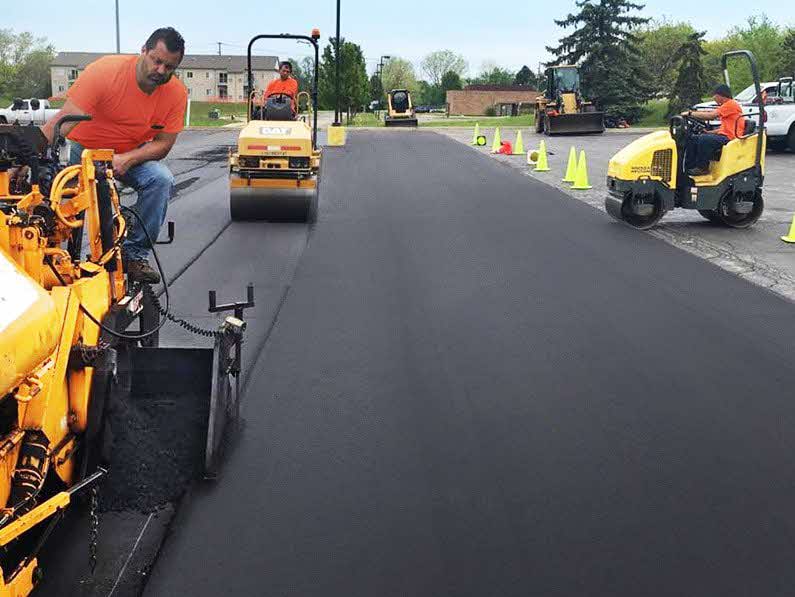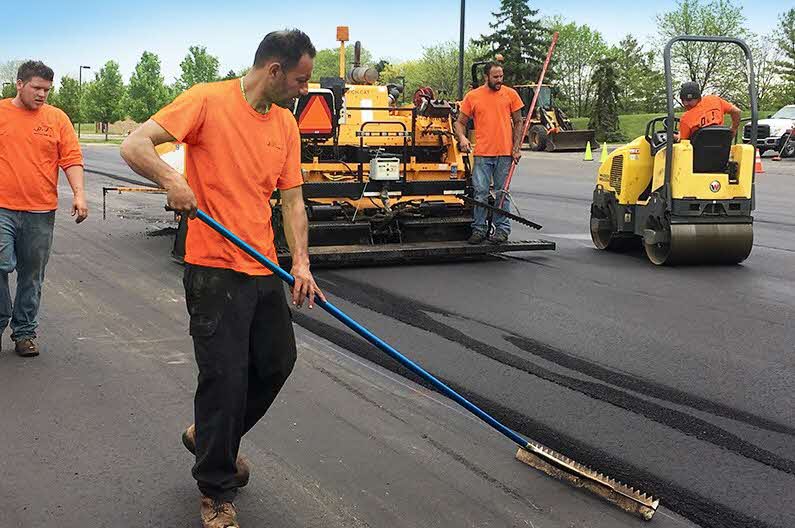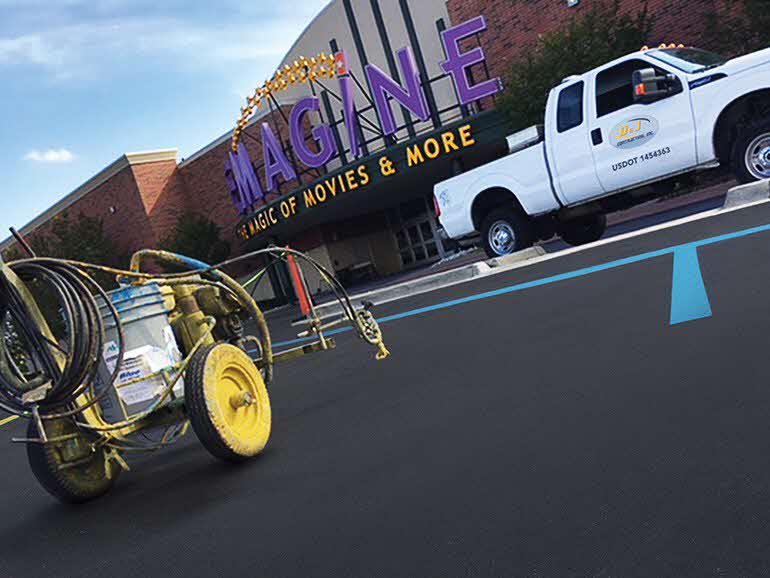Chip Sealing Utica Michigan
We Are Locally Owned
& Operated For 36 Years
Contact Us Today!
About Chip Sealing
Introduction
The construction world is swift, always on a constant evolution path to provide solutions that suit various utilitarian and aesthetic needs. One of the solutions that has gained incredible popularity in the sector of commercial properties is Chip Sealing, a method that uniquely balances durability, aesthetics, and budget consciousness while providing an exceptional paving solution. This comprehensive guide explores Chip Sealing, shedding light on its process, benefits, and application areas like chip seal driveways and chip and seal paving. Read on for detailed insights into this revolutionary paving solution, fit for a broad range of commercial needs.
What is Chip Sealing?
Chip Sealing is an effective pavement surface treatment that involves the application of a layer of asphalt binder, followed by a layer of aggregate chips. This technique is alternatively known as tar and chip driveways or chip and seal driveway, drawing from the materials and process that characterize it. It offers a unique combination of durability and natural, custom look for driveways, parking lots, and even rural roads, making it a preferred option for commercial property owners and tar & chip driveway contractors.
The Process of Chip Sealing
Understanding the chip sealing process is key to appreciate its effectiveness. The process of chip seal paving begins with the thorough cleaning of the existing pavement. Cleaning ensures that the hot liquid asphalt adheres properly to the surface. Following the cleaning, asphalt is evenly sprayed on the road, driveway, walkway, or any chosen surface. Immediately after this, a layer of aggregate (usually crushed stone) is placed evenly on the asphalt coating. The crushed stone is then compacted into the asphalt using a heavy roller to create a smooth, uniform surface. The result is a durable, cost-efficient, and highly aesthetic surface.
Benefits of Chip Sealing
There are multiple benefits associated with chip sealing when used for commercial properties, which build its credentials as a reliable pavement solution.
Durability
The first advantage lies in its durability. Chip sealing creates a resilient and robust surface able to withstand harsh weather conditions, heavy traffic, and high wear and tear. With proper maintenance, a chip sealed surface can last for several years, making it an economical choice for commercial property owners.
Cost-Effective
Compared to traditional asphalt paving, chip sealing is far more cost-effective. The materials needed for chip sealing are relatively inexpensive, and the process is less labor-intensive, leading to lower installation costs. The longevity of chip-sealed surfaces also means that costs for replacement or major repairs are significantly reduced.
Aesthetically Pleasing
Chip sealing offers a more natural and customizable appeal compared to standard asphalt or concrete. Aggregate used in chip sealing can come in various colors, allowing for customization to match the surrounding landscape or color of the commercial property. This paving technique lends a rustic charm, increasing curb appeal.
Chip Sealing Applications
Chip sealing plays a significant role in various commercial properties, most notable in creating chip seal driveways, paths, and parking areas. Its capacity to withstand heavy and constant usage, combined with its aesthetic appearance, makes it ideal for large areas that require a lasting and visually appealing surface.
Conclusion
Chip sealing stands as a technologically advanced solution that brings efficiency and aesthetics into commercial properties. Its ability to create robust, charming and cost-effective paved surfaces makes it an intelligent choice for property owners and managers. From tar and chip driveways to expansive parking lots, chip sealing delivers multiple tangible benefits.
Choosing reliable tar & chip driveway contractors is key to ensuring that you optimize the multiple benefits this technique offers. Hence, when considering chip seal paving for your property, it’s essential to work with contractors who bring experience, expertise, and a dedication to delivering top-quality results to the table.
Call to Action
If you’re considering chip sealing for your commercial property, be it a new installation or service needs, don’t hesitate to contact our dedicated and experienced team. We are industry leaders in providing durable, cost-effective and attractive chip sealing solutions tailored to your unique needs.
Contact Us Today for a FREE
Chip Seal Quote






About Utica, Michigan
History
The city now known as Utica was platted by Joseph Stead in 1829, who named it “Harlow”. Others referred to the community as “Hog’s Hollow” or “McDougalville”, until a few years later it was named “Utica” by settlers from New York, in honor of the city of the same name in that state. This was common of settlers in this region, and is reflected in the names of nearby cities such as Rochester, Troy, and Livonia that are also named for New York cities.
By the 1940s, Utica was the center of a region of dairy farms and truck gardens. It had a flour mill and shipped rhubarb. Dodge Park a few miles south on the Clinton River was a state park.
As the 1950s progressed, Detroit auto companies began to build factories in neighboring Sterling and Shelby Townships, and the surrounding area began a transformation to an industrial economy.
Utica boasts a small historic district centered on Cass Avenue and Auburn Road, but few of the buildings predate 1906, due to destructive fires in 1905 and 1906.
Geography
Utica is in western Macomb County, bordered to the south by the city of Sterling Heights and to the north by Shelby Charter Township. Highways M-53 and M-59 serve the city. M-53 crosses the east side of the city, leading north 13 miles (21 km) to Romeo and south 8 miles (13 km) to Warren, while M-59 runs along the southern border of the city, leading east 8 miles (13 km) to Interstate 94 and west 15 miles (24 km) to Pontiac. Downtown Detroit is 21 miles (34 km) to the south.
According to the U.S. Census Bureau, Utica has a total area of 1.78 square miles (4.61 km), of which 0.02 square miles (0.05 km2) are water. The Clinton River passes through the center of the city, flowing southeast and then east to Lake St. Clair.
Demographics
| Census | Pop. | Note | %± |
|---|---|---|---|
| 1880 | 493 | — | |
| 1890 | 563 | 14.2% | |
| 1900 | 562 | −0.2% | |
| 1910 | 496 | −11.7% | |
| 1920 | 588 | 18.5% | |
| 1930 | 873 | 48.5% | |
| 1940 | 1,022 | 17.1% | |
| 1950 | 1,196 | 17.0% | |
| 1960 | 1,454 | 21.6% | |
| 1970 | 3,504 | 141.0% | |
| 1980 | 5,282 | 50.7% | |
| 1990 | 5,081 | −3.8% | |
| 2000 | 4,577 | −9.9% | |
| 2010 | 4,757 | 3.9% | |
| 2020 | 5,245 | 10.3% | |
| U.S. Decennial Census | |||
2010 census
As of the census of 2010, there were 4,757 people, 2,218 households, and 1,245 families living in the city. The population density was 2,781.9 inhabitants per square mile (1,074.1/km2). There were 2,463 housing units at an average density of 1,440.4 per square mile (556.1/km). The racial makeup of the city was 90.4% White, 1.9% African American, 0.5% Native American, 3.5% Asian, 1.9% from other races, and 1.8% from two or more races. Hispanic or Latino of any race were 3.8% of the population.
There were 2,218 households, of which 23.6% had children under the age of 18 living with them, 37.8% were married couples living together, 14.0% had a female householder with no husband present, 4.3% had a male householder with no wife present, and 43.9% were non-families. 38.0% of all households were made up of individuals, and 15.9% had someone living alone who was 65 years of age or older. The average household size was 2.13 and the average family size was 2.80.
The median age in the city was 41.7 years. 17.9% of residents were under the age of 18; 8.8% were between the ages of 18 and 24; 27.4% were from 25 to 44; 28.3% were from 45 to 64; and 17.4% were 65 years of age or older. The gender makeup of the city was 47.4% male and 52.6% female.
2000 census
As of the census of 2000, there were 4,577 people, 1,952 households, and 1,184 families living in the city. The population density was 2,578.2 inhabitants per square mile (995.4/km2). There were 2,005 housing units at an average density of 1,129.4 per square mile (436.1/km). The racial makeup of the city was 93.77% White, 0.92% African American, 0.37% Native American, 2.56% Asian, 0.74% from other races, and 1.64% from two or more races. Hispanic or Latino of any race were 2.10% of the population.
There were 1,952 households, out of which 27.2% had children under the age of 18 living with them, 43.8% were married couples living together, 13.3% had a female householder with no husband present, and 39.3% were non-families. 34.2% of all households were made up of individuals, and 10.8% had someone living alone who was 65 years of age or older. The average household size was 2.29 and the average family size was 2.96.
In the city, the population dispersal was 21.0% under the age of 18, 9.6% from 18 to 24, 31.7% from 25 to 44, 23.2% from 45 to 64, and 14.5% who were 65 years of age or older. The median age was 37 years. For every 100 females, there were 92.9 males. For every 100 females age 18 and over, there were 91.8 males.
The median income for a household in the city was $38,683, and the median income for a family was $57,156. Males had a median income of $36,912 versus $26,353 for females. The per capita income for the city was $21,615. About 4.8% of families and 7.0% of the population were below the poverty line, including 6.7% of those under age 18 and 17.3% of those age 65 or over.
Education
Utica Community Schools operates public schools, including Utica High School, Eppler Junior High School Flickinger Elementary School, and Wiley Elementary School. They serve the communities of Sterling Heights, Utica, and Shelby Township.
Contact Us Today for a FREE
Chip Seal Quote
Our Chip Seal services are available in Utica as well as all of Macomb County.
Our dedicated team at D&J Contracting Inc is at-the-ready to provide you with great customer service and first class Chip Seal services. Reach out to us at (586) 954-0008 to discuss your Chip Seal needs today!